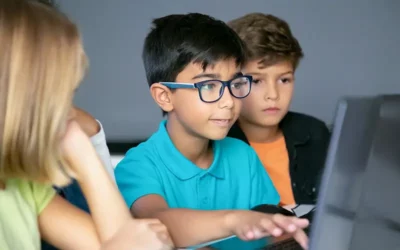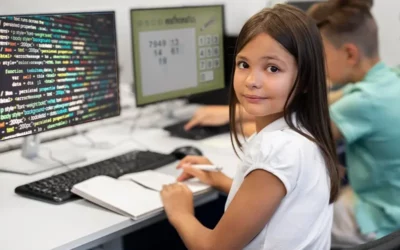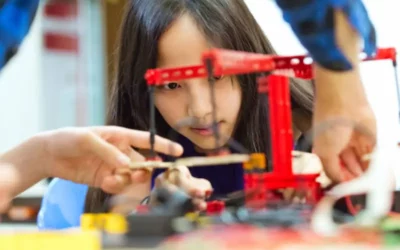In today’s digital age, computers have become an integral part of our lives, permeating almost every aspect of society. From education to entertainment, technology has revolutionized the way we learn and engage with the world around us. One area where this impact is particularly noticeable is in the realm of gaming. Video games have evolved from simple pixelated graphics to immersive, realistic experiences that captivate players of all ages.
While free computer games for kids offer numerous benefits, such as problem-solving skills, strategic thinking, and hand-eye coordination, concerns have also been raised about the potential negative effects of excessive screen time and exposure to inappropriate content.
As a result, parents and educators are increasingly looking for safe and age-appropriate gaming options for their children.

One excellent solution to this dilemma is the availability of free computer games for kids. These games provide a cost-effective way for children to engage with technology in a fun and educational manner.
Free games offer an opportunity to explore various genres, from puzzle-solving adventures to creative building simulations, without the need for a significant financial investment.
Free computer games for kids encourage collaboration and social interaction. Many games offer multiplayer modes where children can play together or compete against each other, fostering teamwork, communication, and friendly competition.
These interactions provide an opportunity for children to develop social skills, build friendships, and learn how to work together towards common goals.
In this era of digital advancement, free computer games for kids offer a valuable resource for parents and educators seeking an engaging and educational experience for children. With their accessibility, affordability, and diverse range of options, these games provide an avenue for children to explore, learn, and grow in a safe and interactive manner.
So, let’s dive into the world of free computer games for kids and unlock the endless possibilities they offer!
Table of contents
The Benefits of using computer games as an educational tool
In recent years, computer games have undergone a remarkable transformation from being solely entertainment to becoming a valuable educational tool. With the rapid advancement of technology, educators and researchers have recognized the potential of computer games to engage and motivate learners, making the learning process more enjoyable and effective.
In this blog post, we will explore the numerous benefits of using computer games as an educational tool and how they can enhance learning outcomes for students.

Enhances Engagement and Motivation
Computer games’ capacity to draw in and hold kids’ attention is one of their major educational benefits. The interactive and immersive aspects of games are frequently difficult for traditional teaching approaches to match.
Teachers can create a dynamic and engaging learning environment that encourages students to actively participate and explore diverse concepts by incorporating instructional information into games.
Games’ competitive nature, prizes, and immediate feedback give players a sense of accomplishment and keep them interested, which promotes learning.
Facilitates Active Learning
Computer games encourage students to participate actively in their own education by promoting active learning. To advance in the game, students must make choices, work through issues, and use critical thinking techniques.
This is in contrast to simply receiving knowledge. Students can explore and experiment with this hands-on method, which encourages a deeper comprehension of the material. Students can experience real-world situations and learn to code for kids via trial and error by incorporating instructional content into games, which improves memory retention and real-world applicability.
Encourages Collaboration and Social Skills
Multiplayer features are common in computer games, encouraging student cooperation and teamwork. Through cooperative problem-solving and communication, these games give students the chance to develop their interpersonal and communication skills.
Playing cooperative video games encourages teamwork, empathy, and cooperation—all crucial traits for the workforce of the twenty-first century. In addition, multiplayer games frequently feature players from different racial and ethnic origins, fostering cross-cultural dialogue and the growth of understanding and awareness of other cultures.
Personalized Learning and Adaptability
Computer games offer the unique ability to adjust to the demands and skills of each learner. Modern game-based learning systems may track students’ development, pinpoint their areas of strength and weakness, and offer customized feedback and challenges in response.
With this personalized method, students can learn at their own pace without feeling rushed or uninterested. Computer games encourage a more effective and efficient learning experience by accommodating different learning preferences and styles.
Transdisciplinary Skills Development
Computer games can encourage the development of a variety of transdisciplinary abilities in addition to teaching specific subjects. Games frequently call for skills like problem-solving, reasoning, judgment, spatial awareness, and hand-eye coordination, among others.
These abilities are applicable to a variety of real-world scenarios and cross-disciplinary boundaries. Students can learn and hone these skills, which are highly valued in today’s fast-changing digital world, by playing computer games.
Educational Themes in Free Computer Games
Computer games become more than just a source of pleasure in the modern digital age. They have developed into potent instructional tools that enthrall players of all ages while delivering important information. Particularly popular as easily accessible resources for learning various disciplines are free computer games.
Four key subject areas stand out among the wide range of educational themes: math, science, history, and language arts. We’ll go into these topics in this blog article and examine how free online games, including those designed for computer for kids, are changing how we interact with education.

Math
Mathematics is a subject that often intimidates students, but computer games have found innovative ways to make it engaging and enjoyable. Numerous free games provide interactive platforms to reinforce math skills, from basic arithmetic to complex problem-solving.
Some games incorporate puzzles, quizzes, and challenges that require players to utilize mathematical concepts to progress. By combining fun gameplay with math exercises, these games promote active learning and encourage players to develop critical thinking and logical reasoning skills.
Science
Free computer games offer a wealth of opportunities to explore the captivating world of science. Whether it’s biology, physics, chemistry, or astronomy, science-themed games provide interactive simulations, experiments, and virtual laboratories.
Players can experiment with different phenomena, conduct virtual investigations, and even simulate complex scientific processes. These games not only enhance scientific knowledge but also foster curiosity, experimentation, and a deeper understanding of the natural world.
History
History comes to life through free computer games, enabling players to immerse themselves in different time periods and experience historical events firsthand. These games often incorporate historical narratives, allowing players to interact with famous figures, explore ancient civilizations, and participate in significant historical moments.
By blending storytelling with gameplay, history-themed games make learning memorable and engaging, encouraging players to develop a greater appreciation for the past and its impact on the present.
Language Arts
Language arts encompass various aspects of literacy, including reading, writing, grammar, and vocabulary. Free computer games in this realm offer innovative approaches to improving language skills. Some games focus on storytelling and narrative, promoting reading comprehension and literary analysis.
Others provide grammar and vocabulary exercises in a gamified format, making language learning more enjoyable. These games not only enhance linguistic abilities but also foster creativity, critical thinking, and communication skills.
Top Free Computer Games for Kids
Computer games have dominated children’s life in the current digital era. They promote creativity, problem-solving abilities, and teamwork in addition to providing entertainment and educational advantages. We’ve put up a selection of the best free online games for kids, including coding games for kids, out of the many options accessible. This way, young minds can engage in activities that foster both learning and enjoyment.
These games blend enjoyment and education, making them ideal for exploring and enjoying by young brains. Let’s plunge into the gaming virtual world and explore the thrilling experiences that lie ahead!
Minecraft

A sandbox game that lets users create and explore virtual worlds, Minecraft is one of the most played games among both children and adults. With countless options, kids can use blocks made of various materials to build anything from straightforward buildings to intricate cities. As players cooperate to construct and thrive in their virtual worlds, the game fosters creativity, problem-solving, and teamwork.
Roblox

Roblox is a website that provides a huge selection of video games and virtual worlds created by users. Kids can develop their own games, play games made by others, and engage with a thriving online community. Roblox provides countless chances for exploration, fantasy, and social connection, from building one’s own virtual theme park to resolving riddles in daring expeditions.
Fortnite

Fortnite is a well-known battle royale game that has swept the gaming industry. The game encourages strategic thinking, teamwork, and hasty decision-making while emphasizing competition. Kids can play alone or with pals to survive in a virtual world that is getting smaller all the time. Fortnite provides an exciting gaming experience with its vivid graphics and quick-moving action.
Among Us

The objective of the multiplayer game “Among Us” is to identify imposters among an astronaut team aboard a spaceship. As players work together to figure out who the imposters are, it fosters analytical thinking, deductive reasoning, and social interaction. Among Us has gained popularity among both children and adults thanks to its straightforward gameplay mechanics and compelling plot.
ABCmouse

ABCmouse is a learning game for young kids that emphasizes early learning ideas in reading, arithmetic, and science. Songs, puzzles, and interactive activities are all used in the game to make learning fun and interesting. ABCmouse offers a secure and educational gaming experience with a thorough curriculum and kid-friendly UI.
Tux Paint:

Kids can learn about digital art with Tux Paint, a program that encourages creative drawing. It provides a range of instruments, stamps, and special effects that let kids explore their creative side. Tux Paint offers a platform for young painters to express their creativity and imagination thanks to its user-friendly interface and kid-friendly features.
Scratch

Scratch is a coding platform that uses interactive tales, games, and animations to teach children the fundamentals of programming for kids. In a pleasant and approachable way, it promotes logical reasoning, problem-solving, and computing abilities. Scratch coding for kids encourages young brains to become technology developers by providing a welcoming online community and a huge collection of projects.
Benefits of Playing Free Computer Games
In today’s digital age, computer games, and computer coding for kids have become a prominent form of entertainment for children. While excessive screen time can raise concerns among parents, it’s important to recognize that not all computer games are created equal. Free computer games designed specifically for kids can offer numerous benefits beyond mere entertainment.
These games can foster the development of essential cognitive skills, problem-solving abilities, and decision-making capabilities. Let’s explore how engaging in these games can positively impact a child’s overall growth and learning.

Enhancing Cognitive Skills
Interactive platforms offered by computer games can enhance numerous facets of a child’s cognitive growth. Many video games include riddles, memory tests, and logic-based challenges, all of which call for sharp thinking and quick reflexes.
Kids can enhance their cognitive abilities, such as memory, attention span, and processing speed, by participating in these activities. Their capacity to analyze information, think critically, and solve issues effectively can be improved by regular exposure to such challenges.
Developing Problem-Solving Skills
A vital life skill that kids need to start developing at a young age is problem-solving. Free computer games frequently confront players with challenging issues that call for in-depth analysis, the consideration of numerous factors, and the creation of winning countermeasures.
Children develop the ability to think creatively, modify their strategy, and persist until they find a solution as a result of frequent exposure to these difficulties. Such virtual world experiences can help kids develop real-world problem-solving abilities that are useful in both academic and social contexts.
Building Decision-Making Skills
Children play a lot of computer games where they have to make choices that affect their progress and results. These games assist in the development of a child’s decision-making skills, whether it is selecting the best course of action, setting priorities, or managing resources.
Kids gain decision-making skills by navigating through virtual scenarios that teach them to consider pros and drawbacks, weigh alternatives, and evaluate possibilities. This develops their capacity for critical thought, decision-making under duress, and taking into account the long-term effects of their choices.
Encouraging Collaboration and Social Skills
Free computer games frequently feature multiplayer capabilities, allowing youngsters to interact with their friends in a virtual setting. This promotes collaboration and social skills. Children who play together to accomplish common goals, engaging in activities for kids that encourage cooperation, develop their social, communication, and teamwork abilities.
These games offer a venue for beneficial social interactions and the development of crucial interpersonal skills, whether players are coordinating strategies, working together to solve puzzles, or participating in friendly rivalry.
Providing a Safe Learning Environment
Free computer games for children are created to provide a safe learning environment where kids may explore, experiment, and learn from their mistakes. They can face obstacles without real-world repercussions in this virtual environment, giving kids the freedom to take risks and pick up important lessons in a safe environment.
Children gain resiliency, persistence, and a growth mentality by experiencing both the benefits of success and the costs of failure.
Tips for Parents and Educators
In today’s digital age, computer games have become an integral part of many children’s lives. While some parents and educators may be concerned about the potential negative effects of gaming, it’s important to recognize that not all games are created equal.
In fact, there are numerous free computer games available that can provide educational and developmental benefits for children. By following a few simple tips, parents and educators can help kids get the most out of playing these games, fostering their growth and learning in an engaging and enjoyable way.

Encourage children to play age-appropriate and educational games
With so many alternatives available, it’s critical to point kids towards games that are both appropriate for their age and instructive. Find games that will appeal to their skills and interests while encouraging learning about things like problem-solving, critical thinking, creativity, and teamwork. Educational games for kids provide an engaging way for children to learn while having fun.
You can make educated decisions using the age guidelines and user evaluations that are frequently found on websites and app stores.
Establish time constraints and a balance
Free computer games can be helpful, but it’s important to set time limits that are realistic and maintain a balance between gaming and other activities. Encourage your child to engage in physical activity, interact with friends, read books, express themselves creatively, and discover new interests. In this way, players can take advantage of gaming’s advantages while also
Playing together and fostering communication
Play together with your child to promote communication and make gaming a shared experience. This gives you a chance to get to know them better while also giving you a chance to watch them play, give them advice, and talk about the ideas and abilities they are learning.
Have frank and insightful discussions regarding the game’s themes, tactics, and any worthwhile lessons that may be applied in real life.
Teach responsible digital citizenship
Teach good digital citizenship: Interactions with other players are a common feature of online gaming. Teach your child the value of polite dialogue, fair play, and empathy for others as you discuss responsible digital citizenship.
Assist them in dealing with difficulties, disputes, and any online safety concerns that may develop while playing. Help them comprehend the effects of their actions.
Encourage critical thinking and problem-solving
Numerous free computer games are created to improve problem-solving and analytical abilities. Help your child build methods, evaluate scenarios, and exercise critical thinking by encouraging them to approach obstacles in games with a problem-solving perspective. Fostering resilience and a growth mentality by encouraging kids coding languages to endure and learn from mistakes.
Use resources for learning that are game-based
Investigate websites and apps for learning that provide game-based learning materials. These materials frequently include educational material into fun games, fusing the two. Encourage your child’s school to include game-based learning in their curriculum or to use internet tools to enhance their learning that is relevant to their interests and academic requirements.
Safety Concerns and Parental Controls
In recent years, online gaming has become increasingly popular among children and teenagers. With its interactive nature and vibrant communities, it offers a platform for young gamers to connect, compete, and have fun.
However, while online gaming provides numerous benefits, it also comes with safety concerns that parents and guardians should be aware of. In this blog post, we will discuss some of the potential dangers associated with online gaming and provide practical tips on how to protect kids from these risks. It’s crucial to ensure that children not only have access to fun and entertainment but also learn about good manners for kids, respectful communication, and responsible behavior while engaging in online gaming environments.

Inappropriate Content and Online Predators
Online predator encounters and exposure to unsuitable content are two of the main issues with online gaming. Players can frequently communicate with one another through voice chat or chat features on online gaming platforms. Children may be exposed to inappropriate language, cyberbullying, or even those who may have harmful intentions due to this unrestrained contact.
It is essential to implement stringent parental controls on gaming platforms and devices in order to shield children from these risks. Limit or disable chat features using the built-in safety settings to make sure kids can only talk to approved friends or contacts. Encourage them to report any inappropriate behavior they see while gaming and teach them the value of avoiding disclosing personal
information online.
Gaming Addiction and Excessive Screen Time
Online gaming’s potential for addiction and prolonged screen time raises yet another issue of safety. Long-term online gaming usage might cause people to disregard other crucial facets of life, such as employment, exercise, and social relationships. It’s important for parents and guardians to monitor and educate their children about responsible online gaming, considering resources like a dictionary for kids to ensure they have a comprehensive understanding of potential risks and healthy balance.
Parents should develop precise recommendations for screen time limitations in order to reduce these concerns. Set time limits on gaming sessions and motivate youngsters to do other things like play outside, pursue hobbies, or spend time with family and friends. A healthy lifestyle and the prevention of addiction can both be supported by finding a balance between gaming and other duties.
In-App Purchases and Online Scams
Many online games for kids allow for in-app purchases, which allow users to use real money to acquire in-game currency or virtual goods. This function may be dangerous, particularly for younger players who might not completely grasp the idea of using real money in a game. Unchecked in-app purchases may incur unforeseen fees or financial losses.
Parents should monitor and regulate the use of payment methods connected to gaming accounts to safeguard children from the dangers associated with in-app purchases. To stop unauthorized purchases, employ parental control tools or set up password protection. Children should also be made aware of the dangers of online fraud and the value of never disclosing sensitive information to strangers.
Cybersecurity and Account Safety
Hackers and con artists are drawn to online gaming accounts as appealing targets. Account hacks may lead to lost progress, virtual item theft, or even the compromise of personal data. For example, children can be more likely to fall for phishing scams or download hazardous malware.
Children should use strong, one-of-a-kind passwords and, whenever possible, two-factor authentication to protect their gaming accounts. Teach them about safe internet behavior, such as staying away from dubious links and downloading files only from reliable sources. Discuss the potential repercussions of exchanging account information on a regular basis and the significance of keeping account privacy.
Conclusion
In conclusion, this discussion has highlighted the main points regarding the benefits of using free computer games and computer for kids for educational purposes. We have explored how these games can effectively engage and motivate learners, enhance critical thinking skills, and foster collaboration and problem-solving abilities.
By leveraging the interactive and immersive nature of computer games, educators can create a dynamic learning environment that captivates students and encourages active participation.
BrightChamps is an extraordinary platform that ignites young minds with the power of coding. It is a creative wonderland where kids dive into the captivating world of programming, learning to unravel complex algorithms and craft their own digital masterpieces.
With a holistic curriculum, CodeChamps nurtures the innate problem-solving abilities of children, fostering their creativity and critical thinking. CodeChamps is where dreams come alive, and the future of innovation takes flight.
One of the key advantages of incorporating free computer games into education is their ability to make learning enjoyable and entertaining. By presenting educational content in the form of games, students are more likely to remain engaged and motivated throughout the learning process.
This engagement can lead to increased knowledge retention and a deeper understanding of the subject matter. Another significant benefit of using free computer games for educational purposes is the opportunity for collaborative learning.
Many games offer multiplayer options that encourage students to work together, communicate effectively, and collaborate towards a common goal. This fosters teamwork and social skills while providing a platform for students to learn from one another.
In conclusion, free computer games offer numerous benefits for educational purposes. They engage students, promote critical thinking, foster collaboration, and provide a customizable learning experience.
Frequently Asked Questions
A1: Some popular free computer games for kids include Minecraft, Roblox, Fortnite, Among Us, and Animal Jam.
A2: To download free computer games for kids, visit reputable websites like Steam, Epic Games Store, or official game developer websites, where you can find free games to download.
A3: Free computer games can vary in terms of safety. It is essential to choose games from trusted sources and ensure they are age-appropriate. Parental guidance and monitoring are recommended for a safe gaming experience.
A4: System requirements for free computer games vary depending on the game. Generally, they are designed to work on most modern computers. It’s best to check the specific game’s requirements listed on the game’s website or download platform.
A5: Some free computer games for kids can be played offline, but many require an internet connection for updates or multiplayer features. Check the game’s requirements or description to determine if it can be played offline.
A6: Yes, there are educational free computer games available for kids. Examples include ABCmouse, Scratch, Khan Academy Kids, and Prodigy Math Game.
A7: You can check the game’s age rating or recommended age information provided by the game developer or download platform. Additionally, reading reviews or trying the game yourself can help determine its suitability for your child.
A8: Some free computer games for kids are available on tablets or mobile devices. Look for games specifically designed for these platforms on their respective app stores.
A9: Yes, there are multiplayer free computer games for kids. Some popular ones include Fortnite, Among Us, Roblox, and Minecraft, which offer multiplayer features for kids to play with friends.
A10: The frequency of new free computer games being added to websites can vary. It depends on the website or platform, but many offer regular updates and additions to their game libraries.


 We are an army of educators and passionate learners from BrightChamps family, committed to providing free learning resources to kids, parents & students.
We are an army of educators and passionate learners from BrightChamps family, committed to providing free learning resources to kids, parents & students.

























